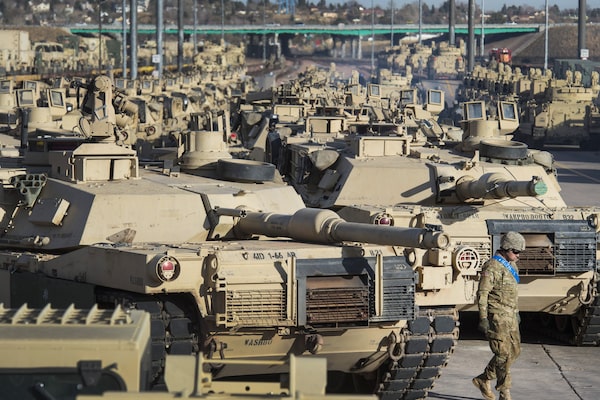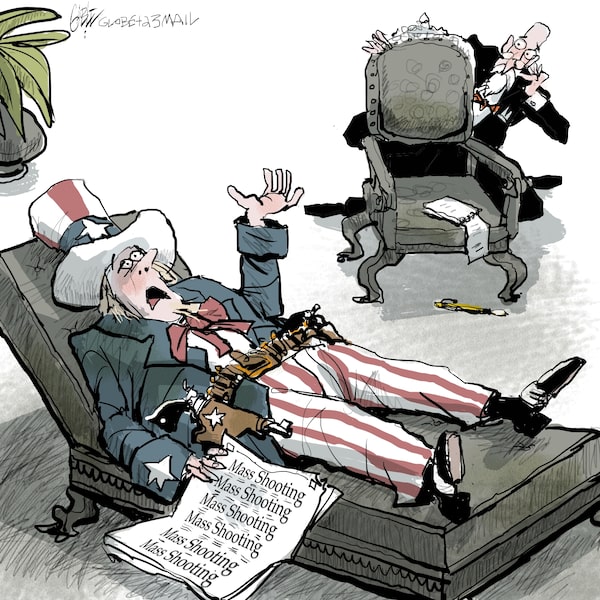Good morning,
Germany will supply its Leopard 2 tanks to Ukraine, it announced on Wednesday, overcoming misgivings about sending heavy weaponry that Kyiv sees as crucial to defeat the Russian invasion but Moscow cast as a needless provocation.
Just days after arguing against granting Kyiv’s requests, Washington was ready to start a process that would eventually send M1 Abrams battle tanks to Ukraine, two U.S. officials said yesterday. A third official said the U.S. commitment could total about 30 tanks delivered over the coming months.
Foreign Affairs Minister Mélanie Joly says Canada is working with allies, but refused to say whether that means sending along battle tanks to Ukraine.

A soldier walks past a line of M1 Abrams tanks, Nov. 29, 2016, at Fort Carson in Colorado Springs, Colo. In what would be a reversal, the Biden administration is poised to approve sending M1 Abrams tanks to Ukraine, U.S. officials said Tuesday.CHRISTIAN MURDOCK/The Associated Press
This is the daily Morning Update newsletter. If you’re reading this on the web, or it was forwarded to you from someone else, you can sign up for Morning Update and more than 20 other Globe newsletters on our newsletter signup page.
Budget to focus on health care, green energy, Freeland says
Finance Minister Chrystia Freeland says her 2023 budget will prioritize spending on health care and the green energy transition, while ensuring the government’s overall fiscal plan is sustainable during what is expected to be a challenging year.
Speaking with reporters on the sidelines of a cabinet retreat in Hamilton, Freeland acknowledged a slowing economy could leave the federal government with less tax revenue to spend.
However, Ms. Freeland said Canadians also expect Ottawa to support health care and she described the shift to clean energy as “a once-in-a-generation moment” that Canada must seize.
- Andrew Coyne: The federal government’s fiscal plan is a sham
Canadian tech company’s platform will play key role in U.S. push for private refugee sponsorship
Virtually everything about the new U.S. Welcome Corps is Canadian-inspired. The program – announced last week by Secretary of State Antony Blinken to recruit Americans to help settle refugees – is modelled on Canada’s long-running Private Sponsorship of Refugees system. The Welcome Corps’s creators have consulted extensively with non-profits north of the border.
And a key component will be run by a Canadian tech startup. Toronto-based Pairity has built a platform that uses an algorithm to match refugees with sponsors. It also follows up with the newcomers to gather data on how well they integrate. The goal is to increase the chances that refugees find success in their new communities.
Pairity’s technology has previously been deployed on a smaller scale in the Netherlands. But the Welcome Corps will offer its biggest test yet. The company is hoping a successful run may even push Canada to innovate its own refugee sponsorship program, which still relies on manual matching to assign immigrants with the people receiving them.
Got a news tip that you’d like us to look into? E-mail us at tips@globeandmail.com Need to share documents securely? Reach out via SecureDrop
Also on our radar
Federal court dismisses appeal of Rogers-Shaw takeover approval: The Federal Court of Appeal has dismissed the Competition Bureau’s challenge of Rogers Communications Inc.’s proposed $20-billion takeover of Shaw Communications Inc., bringing a deal that has faced repeated hurdles for close to two years a major step closer to the finish line.
Grocer Metro says more price hikes to come: Grocery retailer Metro Inc. received tens of thousands of requests from suppliers for price increases in its past fiscal year, a number that underscores the inflationary pressures across the industry. And more price hikes will hit shelves in the coming weeks, Metro CEO Eric La Flèche said yesterday.
Cameroon setback shows challenges of Canada’s new strategy: An embarrassing setback in a Canadian peace initiative in Cameroon has demonstrated the challenges that could hamper Ottawa’s planned new Africa strategy this year, but federal officials are optimistic the peace talks will still proceed. The federal government is planning to release its Africa strategy in the early months of this year, aiming to boost Canada’s engagement with African countries.
Hockey cards shed light on First Nations players: Upper Deck this month unveiled a “First Peoples Rookie Cards” set featuring eight Indigenous hockey players who did not get this opportunity the first time around. It comes at a time when appreciation for Native American and First Nations influences in the sport is on the rise.
Morning markets
World stocks pause: World stocks paused near five-month highs on Wednesday, as signs that central banks might need to keep hiking interest rates for longer dampened a recent wave of optimism that aggressive monetary tightening among big central banks is almost done. Just before 6 a.m. ET, Britain’s FTSE 100 was off 0.06 per cent. Germany’s DAX fell 0.53 per cent while France’s CAC 40 lost 0.44 per cent. In Asia, Japan’s Nikkei closed up 0.35 per cent. New York futures were lower. The Canadian dollar was down slightly at 74.74 US cents ahead of the Bank of Canada’s interest rate decision later in the morning.
What everyone’s talking about
Editorial: “Mr. Trudeau is right to point out, as he did this week in an interview in La Presse, that the use of the notwithstanding clause by provincial premiers has become ‘trivialized.’ ”
Craig Alexander: “... even when the Bank of Canada is ultimately successful at getting inflation under control, keeping it there will be more difficult than in the past. To do so, the bank will likely have to keep interest rates higher, on average, than before the pandemic, and it will have to make more frequent changes in interest rates than in the past. This sustained higher and more volatile interest-rate reality will have far-reaching economic and financial consequences.”
Today’s editorial cartoon

Brian Gable/The Globe and Mail
Living better
From setting a budget to the test drive – a guide for buying a used vehicle
So, you’ve decided to buy a car. Here’s the first question: new or used? It hasn’t been so simple in pandemic times. The pandemic led to inventory shortages and soaring vehicle prices as people who would normally buy only new cars flooded onto the pre-owned lots. But pandemic challenges aside, the basic principle of buying used remains: Find the right vehicle at the right price and you’ll get good value. Here’s how.
Moment in time: Jan. 25, 1924
Herma Planck-Szabo of Austria on her way to winning the women's figure skating gold medal at the 1924 Chamonix Winter Olympics.Topical Press Agency / Getty Images
The first Winter Olympic Games begin
Originally known as the International Winter Sports Week, the 10 days of competition that began on this day in 1924 in Chamonix, France, were only officially designated as the first Winter Games more than a year after they had ended. Still, the naming convention had little effect on the intensity of the competition, which was mostly fierce – unless you were participating in ice hockey. Defending the gold medal that it had won at the Antwerp Summer Games four years prior, Canada romped to a second straight title, winning all six games it played, scoring 132 goals and conceding just three. That was the only medal that the country would capture at these Games though, as Norway and Finland dominated the proceedings, capturing 28 of the 49 medals handed out. Flying Finn Clas Thunberg proved a class above the rest at the Olympic oval, winning five speed-skating medals – including three golds – to make him the most successful athlete at Chamonix. Austria’s Herma Szabo won gold in the ladies singles figure skating – the only event open to women – while Switzerland captured team gold in a sport known as military patrol, a precursor to what we know today as biathlon. Paul Attfield
Read today's horoscopes. Enjoy today's puzzles.
If you’d like to receive this newsletter by e-mail every weekday morning, go here to sign up. If you have any feedback, send us a note.